French researchers have observed the positive effects of ketamine in patients with depression resistant to antidepressant treatments. In the future, this new therapeutic avenue could be considered.

- One in five people has suffered or will suffer from depression in their lifetime, according to Inserm.
- About a third of patients are affected by depression that does not respond to antidepressants. This is known as treatment-resistant depression (TRD).
One in five people have been affected or will be affected by a depressive disorder during their lifetime, according to the National Institute of Health and Medical Research (Inserm). Depressive episodes can manifest themselves through different signs such as pathological sadness, cognitive symptoms or loss of pleasure.
Ketamine works on resistant depression
“About one-third of people with depression fail to respond to the most commonly prescribed antidepressants, leading to the diagnosis of treatment-resistant depression (TRD). For these people, finding new effective treatments is a priority”underlined researchers from Inserm, CNRS, Sorbonne University and doctors from AP-HP at the Brain Institute (ICM), in a statement published on October 5.
In addition, antidepressant treatments take an average of three weeks to take effect. A period of time considered too long for French researchers. In a study published in the journal JAMA Psychiatry, the latter examined the effects of ketamine, a treatment generally used as an anesthetic, in 26 patients with resistant depression of severe intensity (TRD) and 30 control subjects.
Lower sensitivity to negative information a few hours after taking ketamine
During the research, patients and the control group rated the probability of occurrence of 40 events considered negative in their lives. The examples given by the researchers were varied: having a car accident, falling ill, losing your wallet. The study authors then informed the participants of the real risks of these events in the general population before questioning them again to estimate the probability of occurrence of these upheavals.
“The research team was interested in updating beliefs in the face of information that participants had received. They showed that healthy subjects tended to update their initial beliefs more after receiving factual information and positive, which was not the case in the population of depressed patients”can we read in the document.
For the purposes of the study, the scientists then administered three doses of ketamine at a subanesthetic dosage (0.5 mg/kg over 40 minutes) to the TRD patients over a week. “Only four hours after the first administration, the ability of patients to update their beliefs in the face of positive information was increased. They became less sensitive to negative information, and regained an ability to update their knowledge comparable to that of subjects witnesses”, the scientists said.
Ketamine, a new therapeutic avenue for resistant depression
Asked by Release, Liane Schmidt, neuroscience researcher at Inserm and co-author of the study, clarified that “Iepients with depression are locked into negative beliefs about themselves, the future, and the world. This cognitive triad at the heart of the disease is resistant to more positive suggestions that contradict them (…) an optimistic cognitive bias is crucial to benefit from good mental health”. The modifications of this cognitive mechanism would therefore be linked to the clinical improvement of the manifestations. “In other words, the greater the ability to update patients’ beliefs, the greater the improvement in symptoms,” the study authors pointed out.
For the researchers, these conclusions make it possible to consider potential therapeutic avenues in the management of depressive disorders resistant to antidepressants.

















